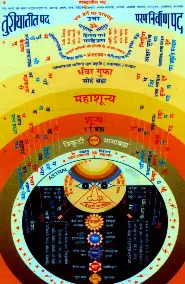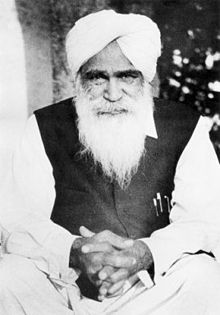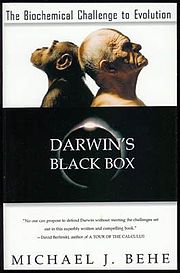|
TRANSLATE THIS ARTICLE
Integral World: Exploring Theories of Everything
An independent forum for a critical discussion of the integral philosophy of Ken Wilber
 David Christopher Lane David Christopher Lane, Ph.D.
Professor of Philosophy, Mt. San Antonio College Lecturer in Religious Studies, California State University, Long Beach Author of Exposing Cults: When the Skeptical Mind Confronts the Mystical (New York and London: Garland Publishers, 1994) and The Radhasoami Tradition: A Critical History of Guru Succession (New York and London: Garland Publishers, 1992). SEE MORE ESSAYS WRITTEN BY DAVID LANE
Prefatory Note & Prologue |
PART I |
PART II |
PART III |
PART IV
The Sound of
Three Books Clapping
Ken Wilber's Under-Reading of Shabd Yoga
Ken Wilber's Achilles' Heel, Part IV
David Lane
Wilber lacks the nuance and the attention to the odd fact and the limitations of scholarship to convince both skeptics and those who know their area better than he.
Wilber has been hailed as a pioneer in transpersonal studies because he has tried to make the subject of mysticism worthy of serious consideration. In his books he comes off as widely read and as an authority on the realms beyond the intellect. Yet, as we have already seen in the previous parts to this series, Wilber has a precocious habit of exaggerating and not being accurate. This hyper-inflationary quality [if this seems a bit harsh, just read his endorsements of Da again] to his work naturally makes it difficult for more skeptically minded readers to accept his speculations, especially when he travels into regions of the psychic, subtle, and causal.
In Part I we saw how Wilber grossly over-estimated the power and status of Da Free John. Just recently, after years of keeping relatively silent on the subject, Wilber has gone public on the World Wide Web and attempted to soften his endorsement of the infamous guru now living in Fiji. It is a rather lame retraction at that, since Wilber does not acknowledge or admit the extent to which Da is a real "fuck-up". Indeed, Wilber just doesn't seem to "get it" about why so many of his readers are turned off by his praise of the one-time California guru from New York.
When it comes to guru appraisements, Wilber is just plain naive. He is as gullible as the rest of us and given his track record with Da perhaps more so. What is perhaps so worrisome about all of this, of course, is that Wilber does not show the kind of levelheaded discrimination that is necessary to separate the wheat from the chaff. It would be one thing to admit to a bit of "greenness" (e.g., "Hey, I am a sucker when it comes to Perfect Masters"), but it is quite another to pose like you are a seasoned veteran of the guru wars.

Another illustrative example of Wilber's naivety is found in his "under-reading" of shabd yoga. As his readers know, Wilber likes to repeatedly write about the higher planes of consciousness that comprise his spectrum psychology: from psychic to subtle to causal to the Transcendental. Depending on the book, these realms can be basic structures or subdivided into small compartments. In each case, however, Wilber points to the "pioneer" or "master" of that respective realm. But whom Wilber considers a "Master" is so arbitrary and contrived that his final choices in this regard are nothing more than subjective guesses—guesses, by the way, which are not based upon deep structural insight into the realm in question, but upon his own discursive reading of what literature is available at the time.
Ken Wilber talks in almost all of his books about the "subtle" realms, where the meditator encounters inner lights and inner sounds (nad and shabd). In one published essay in The Journal of Humanistic Psychology in the early 1980s and republished in his book, The Simple Feelings of Being, wherein he provides a biographical memoir, Wilber states that
“[Kirpal] Singh is the unsurpassed Master of the subtle realm."[1]
Now no doubt Kirpal Singh devotees may agree with this appraisement, but Ken Wilber does not know this to be true. Indeed, he has no idea whatsoever if he is even close to being right. Why? Because in order to make such a categorical statement one would have to draw upon a complete field in which to make such a comparative judgment.
He "knows" it not by direct observation (Wilber never met Kirpal Singh or the hundreds of gurus claiming to be shabd yoga masters in India and elsewhere) but because Wilber happened to have read about three or four books by Kirpal Singh, a guru who also happened to have a better distributor than most other shabd yoga gurus.
 Kirpal Singh (1894-1974)
Kirpal Singh (1894-1974)
I like Kirpal Singh's books too (especially his biography of Jaimal Singh), but just because I like them and find them illustrative does not then extend directly into: "unsurpassed" master. Geez, given that type of criterion—whatever book I happened to have read recently means that the author is the "supreme" authority—could lead to some pretty funny results: Ray Monk as the greatest book reviewer (I just read his nice pieces on the latest Wittgenstein studies).
Let's focus this a bit more: How many different shabd yoga gurus are there in the world? Answer: we don't know. But if we had to estimate those with significant followings it is well over 100. And the number of just Radhasoami disciples tends to be well over two million (again a low ball figure). How many of these people has Wilber met? How many shabd yoga texts or articles are there? Answer: we don't know. But according to Faqir Chand, his guru Maharishi Shiv Brat Lal wrote over 3,000 articles and texts himself. One can only guess that the number is in the multiple thousands. How many has Wilber read? Well, more to the point, how many does Wilber cite and list in his own books? On this we have an answer: anywhere from 1 to 4. And guess what? They are all by the same author: Kirpal Singh (remember we are not talking about shaktipat or kundalini).
I have read over one thousand books directly on the subject myself, been to India 8 times, and completed an M.A. and Ph.D. on the subject, but I really don't know who is the "unsurpassed" master of shabd yoga. I may believe many things and say many things (by the way, I am also guilty like Wilber of inflationary hype at times—just read some of my more "puffy" pieces on gurus in the 1980s), but even in my own little field of expertise which I have concentrated on does not, indeed cannot, lead to me to say unequivocally that so and so is the "Best" or the "Greatest."
All I could say is that I have read such and such books and this one I think is best, or I have met such and such guru and I think this guy is tops. That's it. Yet, Wilber who is not an expert on shabd yoga pontificates in a rhetorical fashion as if he "really" knew. It this kind of unmitigated hype that is so pernicious in Wilber's writings and it shows up in lots of places. Wilber lacks the nuance and the attention to the odd fact and the limitations of scholarship to convince both skeptics and those who know their area better than he. On one level this may sound quite nit-picky on my part since we all exaggerate to some degree when writing. However, the reason it is important to call Wilber's exaggerations into question is because he represents much of why transpersonal psychology is dismissed and why it has as a field more or less floundered.
It flounders because even one of its most heralded theoreticians is liable to over-generalize and make sweeping generalizations that are not only inaccurate but also downright untrue. It is one thing for a community of physicists who know the field to say Einstein is a great physicist, quite another to have someone who has cited 1 to 4 books on the subject (and never met working physicists) to say "Einstein is the unsurpassed physicist!" And I am giving Kirpal Singh the benefit of the doubt in this comparison, since in India there are quite a few shabd yoga gurus who have had bigger followings or who have written more books or who have had a larger impact.
Why does this one little episode matter in the larger mosaic of Wilber's work? Because if each patch of Wilber's work is as weak as this one link (shabd yoga), then the whole system is filled with major, not minor, loopholes. Precision and accuracy is what transpersonal psychology needs, not grandiose statements about who's on first or second or third. A little more "unknowingness" and a little less hubris and then maybe a little more progress in the discipline.
This series of critical essays ended here. A nex Part was announced as "Ken Wilber and "New Age" Science" but the 10-part series was never completed (FV)
Epilogue 2015
But Wilber is not cautious and he is not careful, particularly when it comes to using statistics. The following discussion, cited in Geoffrey Falk's highly critical book on Ken Wilber, sardonically entitled Norman Einstein, captures Wilber's hyperbole:
KW: U.C. Irvine had been given, I don't know, a $500,000 dollar grant or something to do another series of psychic research.... And I said basically that I think that was a misuse of money. Because the real problem is that we have meta-analysis on psychic phenomena....
E.com: Yeah, Dean Radin's book [The Conscious Universe]. It's fabulous.
KW: That's right. It puts it beyond dispute and every statistician agrees [my emphasis]. So I said take your $500,000 and buy a fucking P.R. firm.
E.com: Right.
KW: Because you people just have bad press. Another experiment is not going to change. It's already one hundred percent certain.[2]
Notice Wilber's wording: “beyond dispute”, “every statistician agrees” and “one hundred percent certain.” First, nothing is a hundred percent certain in science, much less statistics dealing with a subject as porous and contestable as psychic powers. Second, no subject is “beyond dispute,” not even in the hardest of subjects, such as physics or chemistry. And, third, how can Wilber possibly know that “every statistician agrees” on the subject. Has he really interviewed them all?
Instead of castigating his numerous critics, Ken Wilber would be much better served if he actually listened carefully to what they have to offer him.
This is irresponsible and unnecessary for Ken Wilber to indulge in such absolutist talk, particularly if he wants his Integral psychology to be taken seriously and not regarded with smirks or derisions. This tendency on Wilber's part almost smacks of religious zealotry or, worse, a conversionary tactic to win over his unsuspecting audience that he is more knowledgeable than he really is.
I personally winced when I first read Ken Wilber's defense of his understanding of evolution by claiming that he had a “Ph.D. minus thesis in biochemistry and biophysics” as if this somehow made his misstatements about the current state of evolutionary theory acceptable. Having a Ph.D. or a lack of one has absolutely nothing to do with the subject at hand, since it is evidence and the accurate portrayal of such that is elemental. But Wilber doesn't deal with his own errors, but rather ends up speaking out of both sides of his mouth when he writes,
“Folks, give me a break on this one. I have a Master's degree in biochemistry, and a Ph.D. minus thesis in biochemistry and biophysics, with specialization in the mechanism of the visual process. I did my thesis on the photoisomerization ofrhodopsin in bovine rod outer segments. I know evolutionary theory inside out, including the works of Dawkins et al....
Instead of a religious preacher like Dawkins, start with something like Michael Behe's Darwin's Black Box: The Biochemical Challenge to Evolution. And then guess what? Neo-Darwinian theory can't explain shit. Deal with it....”[3]

It is richly ironic that Wilber would call Dawkins the religious preacher and not Michael Behe, who really is religious (he is by his own admission a lifelong Roman Catholic). Wilber's citation of Behe's book, Darwin's Black Box is just another indication that he is not as conversant as he claims with current evolutionary thinking, since Behe has been severely criticized on a number of fronts, including a widely cited critique by Kenneth Miller, a distinguished biologist who also happens to be a Catholic. But does Ken Wilber ever go into detail about this? No, and thus he leaves the reader thinking Behe and others of his ilk have driven a “hummer” through the huge hole of evolution by natural selection.
But more pointedly, how can Wilber with a straight face think that saying “Neo-Darwinian theory can't explain shit” is indicative of his expertise on the subject, sans his Ph.D. of course? Ken Wilber is shooting his intellectual integrity in the foot by such disingenuous caricatures. It doesn't have to be so, of course, but in order to remedy the situation Wilber has to stop preaching and stop exaggerating. Integral theory will only blossom when its weakest links are exposed and corrected. Instead of castigating his numerous critics, Ken Wilber would be much better served if he actually listened carefully to what they have to offer him. As one wise sage of India said on many occasions, “Critics are our best friends. They constantly remind us of our own hubris.”
NOTES
[1] Ken Wilber, The Simple Feeling of Being: Embracing Our True Nature, Shambhala, 2004, p. 38.
[2] Geoffrey Falk, "Norman Einstein": The Dis-Integration of Ken Wilber, Chapter V: Kosmic Parapsychology.
[3] http://integralnaked.org/forum/tm.asp?m=37376&p=&mpage=4& (now offline). Reposted at: http://vomitingconfetti.blogspot.nl/2005/05/awaken-white-morpheus.html (now offline)
|
 David Christopher Lane, Ph.D.
Professor of Philosophy, Mt. San Antonio College Lecturer in Religious Studies, California State University, Long Beach Author of Exposing Cults: When the Skeptical Mind Confronts the Mystical (New York and London: Garland Publishers, 1994) and The Radhasoami Tradition: A Critical History of Guru Succession (New York and London: Garland Publishers, 1992).
David Christopher Lane, Ph.D.
Professor of Philosophy, Mt. San Antonio College Lecturer in Religious Studies, California State University, Long Beach Author of Exposing Cults: When the Skeptical Mind Confronts the Mystical (New York and London: Garland Publishers, 1994) and The Radhasoami Tradition: A Critical History of Guru Succession (New York and London: Garland Publishers, 1992).

